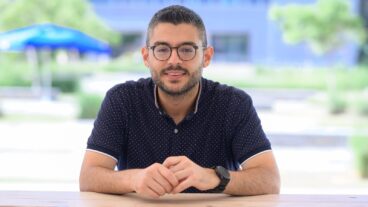Menachem Mazuz’s appointment to the post of attorney-general symbolizes a step forward for Israelis who immigrated from Asian and African countries.It was unlikely when Menachem Mazuz was born in Tunisia in 1955 to a large, religious Jewish family that his parents ever dreamed that he would one day be appointed to Israel’s top legal post.
But it came to pass last week. The appointment of Mazuz as Israel’s 11th attorney-general is being hailed as a triumph representing the ability to rise to the heights of the power elite on the basis of merit, intelligence, and hard work.
Mazuz, 49, is highly regarded by his peers as a knowledgeable, decisive and modest jurist. He also comes from a sector of the population that, until recently, was underrepresented in the country’s corridors of power.
His appointment to this key post – which in the midst of current political events makes him the man who will determine the future of the Sharon government – symbolized a step forward for those who immigrated to Israel from Asian and African countries.
Mazuz was born in 1955 in Djerba, Tunisia, one of ten brothers and sisters. His father was a rabbi and religious judge in Jerba.
The family immigrated to Israel and settled in Netivot, a development town in the Negev, where his parents opened a Judaica store. Mazuz was known as a gifted child while he was in elementary school, and later was sent to study at a youth center in Jerusalem for high school.
After serving in the IDF Armored Corps, he thought of going to medical school, but applied to the Hebrew University departments of law and of physics. He chose law, studying public and administrative law at Hebrew U.
Mazuz worked for several years in the State Attorney’s Office department dealing with petitions to the High Court of Justice. From 1991 until 1995 he coordinated the legal aspects of Israel’s negotiations with Jordan and the Palestinians. In 1995, he was named Deputy Attorney General, a job that he has held ever since. He replaces Elyakim Rubinstein as attorney-general.
Justice Minister Tommy Lapid, said before his appointment, “I am convinced that he is the best choice, both because of his deep knowledge of the law and because of his personality as one who is outspoken in his opinions and liked by all.”
Dr. Yossi Yonah, an education professor at Ben-Gurion University of the Negev, hailed the appointment as “a great achievement that is very impressive.”
While he said that Mazuz makes an excellent role model, he still said that the immigrants from Middle Eastern countries still had to make progress to integrate into the country’s power elite.
“The gap still exists, and Israeli society has to target it, and not deny it by saying we have transcended this problem. There is a gradual change, a gradual improvement, but these things are still incremental and should be moving ahead faster.”
Choices of attorney-general are always scrutinized because of the power it holds – the attorney-general has the dual responsibility of serving as head of the state prosecution and as the government’s legal advisor, who represents it in court and whose legal advice is binding. He therefore is charged with imposing the law on governmental agencies, protecting individual rights, putting criminals on trial, and enforcing the law in every area of life and society.
This particular choice of this new attorney-general was scrutinized exceedingly closely in recent weeks, since the job is currently so important and the fate of the current regime may lie in his hands.
The first major task that Mazuz will face will be deciding whether to whether to indict Prime Minister Ariel Sharon and Deputy Prime Minister Ehud Olmert. Businessman David Appel has already been charged by the state for allegedly bribing them. Mazuz has said that his decision in the case of the prime minister would not be put off any longer than necessary, and that he would approach the decision with “great caution.”
Twenty ministers voted to confirm Mazuz’s nomination by Justice Minister Lapid. Surprisingly, Lapid – not known for his closeness to the religious public – chose Mazuz, the one candidate out of three finalists with a strong religious background.
Lapid said following the appointment that he was pleased the cabinet united behind his candidate. “To the best of my knowledge, the opposition has no reservations against the appointment. This means that a man acceptable across the political spectrum has been appointed to this critical post, which will provide greater force to his positions on vital issues in dispute. Mazuz will have my full support on decisions at his discretion, which are derived solely from the country’s laws.”
Mazuz said that he will adopt a new approach toward his position. He said that the office of the attorney general has received numerous cases that it does not need to deal with, and he intends to remove them from the Justice Ministry’s agenda.
He said he believes “the time has come to reposition the office of the attorney general in relation to the various branches of authority and to reorganize the way it operates.”
Mazuz said that once he finishes his term of office and decides to become a judge, he will first take a couple of years as a “cooling-off” period.
“We live in a harsh reality of violence and law-breaking,” said Mazuz. “where organized crime tries to infiltrate the public establishment, where the law enforcement agencies are mocked and attempts are made to delegitimize the judiciary.”
Having beaten the odds by overcoming the financial and social hardships of his upbringing, it’s a fair assumption that Mazuz will be able to meet the challenges that this most challenging latest chapter of his life will hold.












